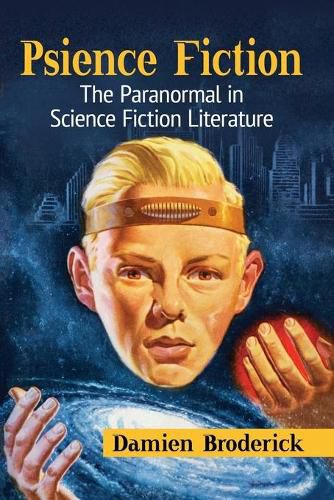Readings Newsletter
Become a Readings Member to make your shopping experience even easier.
Sign in or sign up for free!
You’re not far away from qualifying for FREE standard shipping within Australia
You’ve qualified for FREE standard shipping within Australia
The cart is loading…






This title is printed to order. This book may have been self-published. If so, we cannot guarantee the quality of the content. In the main most books will have gone through the editing process however some may not. We therefore suggest that you be aware of this before ordering this book. If in doubt check either the author or publisher’s details as we are unable to accept any returns unless they are faulty. Please contact us if you have any questions.
Science fiction is often considered a literature of futuristic technology: fantastic warfare among the stars, or ruinous apocalypse on Earth. In the middle of last century, a very different theme suddenly blossomed. This was a fiction of mind powers such as telepathy, precognition of the future, teleportation, symbolic machines reacting to these mental forces and perhaps life beyond death. Driving this explosion of paranormal narratives was John W. Campbell, editor of Astounding Science Fiction magazine, later renamed Analog. Almost single-handedly, Campbell made psience fiction into a dominant movement.
Until now, no scholarly study has dealt specifically with this abrupt shift of emphasis away from space travel, atomic weapons, robots, and other once-imaginary technologies, and into the realm of the paranormal treated as science. Literary critic Damien Broderick surveys this long-ignored terrain, reading a series of influential or characteristic psience fiction novels and short stories, from the 1930s to now. This tour of the psychic fictional landscape is framed by an informed discussion of the dynamics creating this surge of interest in parapsychology, and its absorption into the genre even as real-world military experiments in the paranormal (the US Star Gate program) were being conducted in highly classified secrecy.
$9.00 standard shipping within Australia
FREE standard shipping within Australia for orders over $100.00
Express & International shipping calculated at checkout
This title is printed to order. This book may have been self-published. If so, we cannot guarantee the quality of the content. In the main most books will have gone through the editing process however some may not. We therefore suggest that you be aware of this before ordering this book. If in doubt check either the author or publisher’s details as we are unable to accept any returns unless they are faulty. Please contact us if you have any questions.
Science fiction is often considered a literature of futuristic technology: fantastic warfare among the stars, or ruinous apocalypse on Earth. In the middle of last century, a very different theme suddenly blossomed. This was a fiction of mind powers such as telepathy, precognition of the future, teleportation, symbolic machines reacting to these mental forces and perhaps life beyond death. Driving this explosion of paranormal narratives was John W. Campbell, editor of Astounding Science Fiction magazine, later renamed Analog. Almost single-handedly, Campbell made psience fiction into a dominant movement.
Until now, no scholarly study has dealt specifically with this abrupt shift of emphasis away from space travel, atomic weapons, robots, and other once-imaginary technologies, and into the realm of the paranormal treated as science. Literary critic Damien Broderick surveys this long-ignored terrain, reading a series of influential or characteristic psience fiction novels and short stories, from the 1930s to now. This tour of the psychic fictional landscape is framed by an informed discussion of the dynamics creating this surge of interest in parapsychology, and its absorption into the genre even as real-world military experiments in the paranormal (the US Star Gate program) were being conducted in highly classified secrecy.